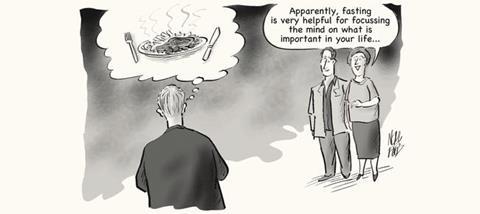
It should read feasting, not fasting.
But despite my flippancy and my silly comment about not approving of the practice, Jesus does, which is far more important. He assumed that those who follow him would fast, as the Sermon on the Mount illustrates. He doesn’t say, ‘if’ you fast, but ‘when’. Oh dear.
He was, and is, counting on those who follow him to step away from the trough for a while.
So, why?
Well, on the few occasions when I have fasted, I have found focus and clarity as a result. Fasting is for us, not for God. It’s not spiritual blackmail, an intercessory hunger strike that’s calculated to turn God’s head and twist his arm. Interrupting the journey of knife and fork to mouth is a useful discipline. Food can control us, and so fasting enables us to see who, or what, is in charge of our lives.
But in this discipline, I have failed miserably and aim to do better.
I’m embarrassed as I remember a time when, as a very young pastor, together with some other ministry colleagues, we decided that we would pray and fast until we saw spiritual breakthrough in our city. There was nothing casual about our strategy. The married ones among us told our wives that we were going to hole up in the flat of one of the single pastors, and we would not return home until we felt our work was done, no matter how many days or weeks it would take.
Of course, there were two significant problems with this unbridled enthusiasm. Firstly, none of us had had much experience with extended times of fasting before (and by extended, I mean missing the odd meal). And then there was the other challenge that none of us had reckoned with. We would have no idea what constituted the ‘spiritual breakthrough’ that we were so earnestly seeking, so we’d really have no clue about when to quit. So often we Christians engage heart without actually bothering to engage brain.
We bade farewell to our wives, tearfully saying that we were not sure how long it would be before we saw them again. Their knowing smiles suggested that they knew it wouldn’t be long.
We prayed for a few hours, late into the evening. After a while, we felt the lack of words, and our rumbling stomachs felt a lack of food. When you are very deliberately choosing to not eat, your appetite is heightened. You know that you are hungry when you start looking at the couch as a potential snack.
And then the releasing moment came. One of us spoke up, at first with hesitation, looking around the room for endorsement, not wanting to be the one to too quickly break up the foodless party. But the group immediately and enthusiastically agreed with the tentative announcement, as one among us spoke: ‘Guys, I just sense that our work is done here. Our prayers have been heard. Let’s go home and get some sleep…’ (and the unspoken addition to the sentence was, ‘and eat’).
Thus we were reunited with our still grinning and completely unsurprised wives, grateful to the one who had shared the ‘prophetic’ insight that meant we could end our brief monastic time.
And the person who spoke up that night, I’m terribly embarrassed to say…was me.
Adapted from Jeff’s forthcoming book with Adrian Plass, All Questions Great and Small (Hodder & Stoughton)



























